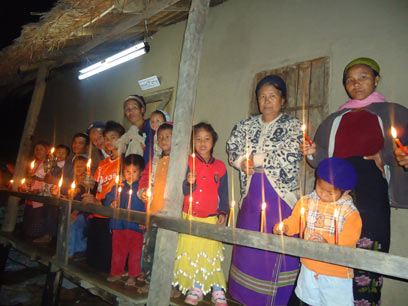
Lighting menorah Photo: Yochanan Phaltual
Members of northeastern Indian community claiming descent from one of Ten Lost Tribes of Israel usher in first night of Jewish holiday with joy and ceremony, as they continue to nourish hope of making aliyah.
The 7,200 members of the Bnei Menashe community of northeastern India ushered in the first night of Hanukkah on Wednesday with joy and ceremony, as they continue to nourish the hope of making aliyah in the near future.
"For most of their sojourn in exile, the Bnei Menashe did not observe Hanukkah nor were they aware of its existence until the modern era.
This, due to a very simple reason: Their ancestors were exiled from the land of Israel some 560 years before the historical events which Hanukkah commemorates,” Shavei Israel Chairman and founder Michael Freund said.
"But as part of their return to the Jewish people, they have embraced the holiday and made it their own, celebrating it together with Jews everywhere.
The Bnei Menashe still in India are anxiously awaiting a decision by Israel's government to allow them to come home to the Jewish state, and we pray that their dream will soon be fulfilled.”

Embracing holiday (Photo: Yochanan Phaltual)
The Bnei Menashe (Hebrew for "sons of Manasseh") claim descent from one of the Ten Lost Tribes of Israel, who were sent into exile by the Assyrian Empire more than 27 centuries ago. They live in India's northeastern border states of Manipur and Mizoram.
Throughout their exile, the Bnei Menashe nonetheless continued to practice Judaism just as their ancestors did, including observing Shabbat, keeping kosher, celebrating the festivals and following the laws of family purity. And they continued to nourish the dream of one day returning to the land of their ancestors, the Land of Israel.
In recent years, Shavei Israel has brought some 1,700 Bnei Menashe back home to Zion. Another 7,200 still remain in India, waiting for the day when they too will be able to return to Israel and the Jewish people.







0 comments:
Post a Comment